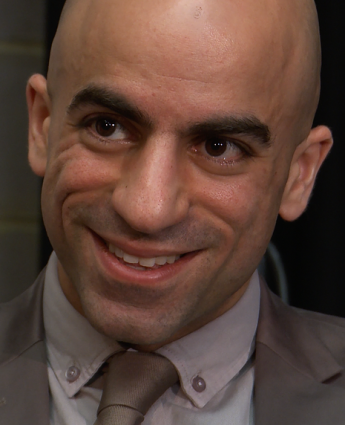
Dr. Ahmed Hankir
Dr Ahmed Hankir MBChB MRCPsych is Senior Research fellow at the Centre for Mental Health Research in association with Cambridge University and Academic Clinical Fellow in Psychiatry at the Institute of Psychiatry, Psychology and Neuroscience at King’s College London.
Dr Hankir is passionate about empowering and dignifying people with lived/living experience of mental health difficulties, challenging mental health related stigma and breaking down the barriers to mental healthcare. Dr Hankir pioneered, ‘The Wounded Healer’ an innovative anti-stigma program that blends the power of the performing arts and storytelling with psychiatry. The Wounded Healer signposts Dr Hankir’s inspirational recovery journey from ‘impoverished and suicidal service-user with mental illness’ to ‘multi-award-winning psychiatrist and mental health advocate’. Dr Hankir has delivered The Wounded Healer to over 75,000 people in 19 countries in five continents worldwide and The Wounded Healer has been integrated into the medical school curriculum of four UK universities. The Wounded Healer has also been adapted into a documentary by filmmakers at the University of London and has been screened in film festivals throughout the globe.
Dr Hankir has given Keynote Lectures alongside Nobel Prize Laureates, Ted speakers and celebrities in national and international conferences and has lectured at some of the most prestigious universities in the world including Harvard, Yale, Padua, Coimbra, Cambridge and Oxford.
Dr Hankir’s research interests include global and minority mental health and pioneering and evaluating innovative programs that challenge mental health related stigma and he has published extensively in these areas. Dr Hankir co-edited a textbook on Islamophobia and Psychiatry with Professor Rania Awaad at Stanford University who presented her research findings on Muslim mental health to Barack Obama at the White House. Dr Hankir was consulted by the New Zealand Government and played an instrumental role in the authorization of $1 million dollars for research on the psychological effects of the Christchurch Mosque terror attack. Dr Hankir presented his research findings on Muslim perceptions of British combat troops to Ministry of Defence officials at Whitehall. Dr Hankir was an expert reviewer for the World Health Organization Good Practice on Community Mental Health Services. Dr Hankir is the recipient of numerous awards including the Royal College of Psychiatrists Foundation Doctor and Core Psychiatry Trainee of the Year Awards which mark the highest level of achievement in psychiatry in the UK.
In recognition of his services to public engagement and education and his research and scholarly outputs, Dr Hankir was appointed Visiting Professor of Academic Psychiatry at the Carrick Institute for Graduate Studies, Florida, USA.
Dr Ahmed Hankir on the importance of kindness (MHAW)
The 18th - 24th of May is Mental Health Awareness Week in the UK and the theme this year is kindness. Dr Ahmed Hankir received the 2013 Foundation Doctor of the Year and the 2018 Core Psychiatric Trainee of the Year at the Royal College of Psychiatrists.
The Wounded Healer Lecture is a lecture that the 2013 Royal College of Psychiatrists Foundation Doctor of the Year Award winner Dr Ahmed Hankir designed, developed and delivered with Dr Rashid Zaman FRCPsych who is a Consultant Psychiatrist and an Associate Lecturer in the Department of Psychiatry in Cambridge University. It is essentially a theatrical rendition of our British Medical Journal publication, 'The Wounded Healer'. We have been fortunate enough to espouse this lecture nationally in the UK (Cambridge University, Manchester University, London, Sheffield) and internationally in the World Psychiatry Association in Slovenia. This clip was taken in Manchester University International Society. Our mission is to take a firm stand against the stigma associated with mental health challenges in the medical profession. We also want to raise the profile of psychiatry and hopefully, by doing so, address the recruitment crisis into this specialty.